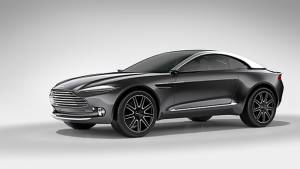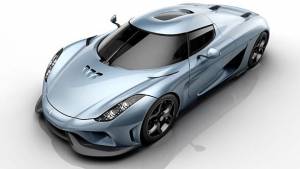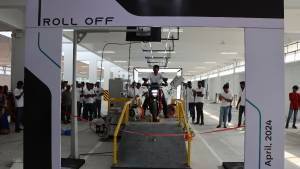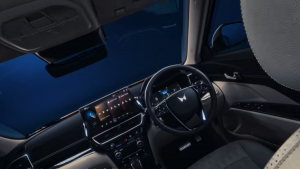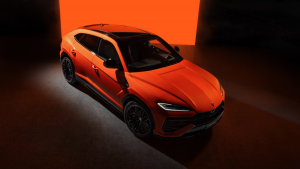2015 Geneva Motor Show: Audi showcases the new Q7 E-tron quattro
A large, luxury SUV that is fuel efficient and while at it, kind to mother nature. This seemingly impossible aberration to the fuel-guzzling, ozone-depleting character of a typical SUV was like a far fetched dream, until now. Audi's boffins at Ingolstadt have managed to redefine the image of a gargantuan SUV and the atypical Audi Q7 E-tron is the result of Audi's attempt at a hybrid SUV. Unveiled at the ongoing Geneva Motor Show, the new hybrid SUV is Audi's first TDI plug in hybrid with quattro all-wheel drive, says Audi.
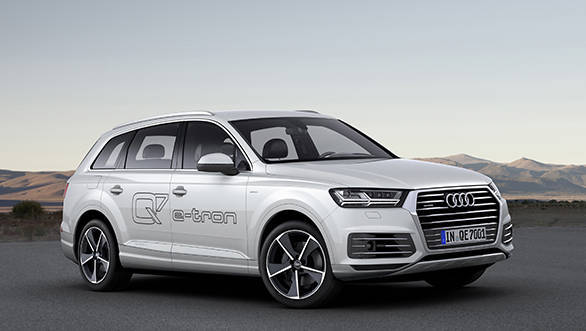
The Audi Q7 E-tron's hybrid powerplant comprises of a 3.0-litre V6 TDI engine and a 17.3kWh lithium-ion battery. The powerplant produces 373PS and 700Nm of torque that results in the SUV sprinting from 0 to 100kmph in a mere 6 seconds, as claimed by Audi. With that kind of performance, the SUV returns a combined fuel efficiency of up to 58.7kmpl with CO2 emissions under 50 grams per kilometre. The Audi Q7 E-tron quattro has a range of up to 1,410km on a full tank and can travel up to 54 kilometres on electric power alone.
The V6 diesel engine is attached to the chassis by means of active engine mounts. Audi says that this new feature is a world first for diesel engines and eliminates unwanted vibrations by means of selective counter pulses. The electric motor is in the shape of a disc and together with a decoupler, is integrated into the eight-speed tiptronic transmission.
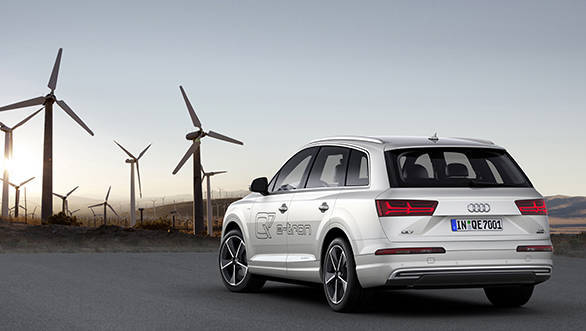
The lithium-ion battery consists of 168 high quality cells and can be fully charged in two hours. In addition, the new Audi Q7 E-tron Quattro also comes with an innovative thermal management system that contributes to the efficiency aspect. The system that is a part of the automatic air-conditioning unit, has an integrated heat pump that utilises waste heat from the electrical components to heat the interiors of the car. Audi says that it is the first company to have introduced such a technology in a series production plug-in hybrid which also helps heat up the interiors faster, thereby extending the electric range by up to 20 per cent.
The Audi Q7 E-tron Quattro comes with four driving modes namely - EV, Hybrid, Battery Hold and Battery Charge. In the EV mode, the car is propelled by means of the electric motor only while in the hybrid mode, the hybrid management system decides on the optimal type of drive to provide performance with efficiency. The system stores the available electrical energy in the the Battery Hold mode and charges the battery when the Battery Charge mode is activated.
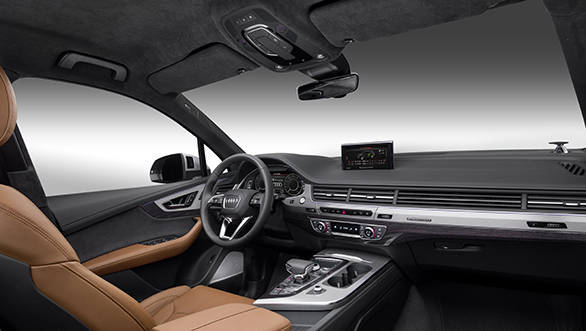
Apart from the driving modes, a new predictive efficiency assistant system ensures that every drop of fuel is saved. The system, by means of information from the navigation, camera and radar can map an image of up to 3km ahead of the route. Therefore, when the car approaches bends, traffic signals and intersections, the system signals the driver to lift -off the throttle. At the same time, the active accelerator pulses to prod the driver to release the accelerator. Audi's MMI navigation is integrated with the hybrid management system of the SUV that utilises information from the navigation data as well as the real time traffic information system to calculate and choose the mode that offers the best fuel-efficiency.
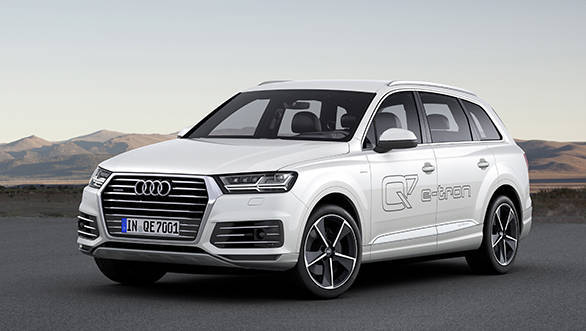
The Audi Q7 E-tron is constructed using lightweight materials and shaped to offer a low 0.34 coefficient of drag, says Audi. The 19-inch wheels are specially designed for the Q7 E-tron Quattro. The interiors are crafted to the company's high quality standards and Audi has also added specific items to the infotainment system to display information about the electric modes.
New additions also include an electromechanical steering and a five-link suspension that is lighter by 60kg over the previous Q7. The list of options include a heads up display, panoramic sunroof and seats with massage function.
The new Audi Q7 E-tron Quattro is expected to be available in the UK markets by the end of 2015 and may also be launched subsequently in the US. There is no word on an Indian launch for now.
AUDI Q7 ENTERS THE VOLT AGE IN GENEVA WITH NEW SUB 50 G/KM Q7 E-TRON QUATTRO
| Ingolstadt/Geneva, March 2, 2015 - Audi has combined its world renowned diesel engine expertise with its equally widely acclaimed flair for technological innovation to create its first TDI plug-in hybrid with quattro all-wheel drive. Making its world public debut at the Geneva Motor Show, the new Q7 e-tron quattro combines a frugal TDI engine with lithium-ion battery technology for a potential range of up to 876 miles and the ability to travel emission-free for over 34 miles on electric power alone, contributing to an official CO2 figure of less than 50 grams per kilometre. The Q7 e-tron quattro is the second Audi model with a powerful plug-in hybrid drive system. With a system output of 373 PS and 700 Nm (516.3 lb-ft) system torque, it accelerates from 0 to 62 mph in just 6.0 seconds, and continues up to a top speed of 139 mph. According to the relevant standard for plug-in hybrid vehicles, however, the large SUV can return up to 166mpg combined, corresponding to CO2 emissions of under 50 grams per km. This value too sets new standards. Like all Audi hybrid models, the Q7 e-tron quattro has also been designed as a parallel hybrid. The highly efficient 3.0 TDI is the latest-generation V6 diesel engine, delivering 258 PS of power and 600 Nm (442.5 lb-ft) of torque. Active engine mounts a world first for a diesel engine eliminate unwanted vibrations through selective counter pulses. The disc-shaped electric motor provides 94 kW and 350 Nm (258.1 lb-ft) of torque. Together with a decoupler, it is integrated into the eight-speed tiptronic. The automatic transmission is outstanding for its high efficiency and low weight. The quattro permanent all-wheel drive, also compact and lightweight, transmits power to all four wheels. During fast cornering, its center differential works closely with the wheel-selective torque control system, an intelligent software feature. 34-mile electric range: best in segment The lithium-ion battery consists of 168 high-quality battery cells and is fluid-cooled. With a capacity of 17.3 kWh, it allows a 34.8 mile range in electric mode another record in the segment. Another efficiency component is the standard thermal management system with integrated heat pump, specially developed for the Q7 e-tron quattro. This makes it possible for the waste heat from the electrical drive components to be made available to the interior of the Q7 e-tron quattro. Audi is the first manufacturer worldwide to introduce this technology in series production in a plug-in hybrid and is thus setting new standards in the areas of interior comfort, climate control efficiency and range in EV mode. As well as heating up the interior more quickly, the customer also benefits from a far-reaching electric driving experience. The new two-phase charging technology installed in the new Q7 e-tron quattro allows charging with up to 7.2 kW of power. Depending on the infrastructure (appropriate high-performance industrial socket) and the charging cable, full charging of the battery takes about two-and-a-half hours. A power charging cable is standard equipment. Audi offers its customers an optional package of e-tron services. They range from changeover to renewably generated electricity (Audi Energy) to installation and customer service. A convenient solution is also provided by the standard e-tron services in the Audi connect portfolio, for controlling functions like charging and air conditioning via smartphone. Four driving modes The hybrid management system controls the operating states of the Audi Q7 e-tron quattro intelligently, flexibly and with high efficiency. The driver can choose between four modes. The EV mode prioritises electric driving, while in hybrid mode hybrid management decides on the type of drive for the most part freely. In battery hold mode, the system stores the available electrical energy, and charges the battery in battery charge mode. The large SUV generally starts in electric mode. To activate the TDI, the driver has to press down on the active accelerator pedal (another innovation from Audi) beyond a certain point of resistance, which depends on the requirements of the hybrid management system. A pressure point must also be overcome for boosting, in which case both the engine and motor work together. When the hybrid mode is active and the eight-speed tiptronic with integrated electric motor is in shift position D, the Audi Q7 e-tron quattro changes to coasting mode once the driver takes his foot off the accelerator. The TDI and electric motor are then deactivated. Should the Audi Q7 e-tron quattro approach a slower vehicle ahead or a traffic circle or the city limit, the coasting mode ends in favour of controlled regenerative deceleration. To detect the traffic situation ahead, the data from MMI navigation plus, the front camera and (if adaptive cruise control is on board) the radar sensors are used. When driving in shift position S and in the battery charge mode, energy recovery begins as soon as the driver releases the accelerator. The driver can progressively influence the degree of recuperation by operating the shift paddles on the steering wheel. The majority of all brake applications in everyday use also occur via the electric motor. In the event of moderate or sharper deceleration, the hydraulic brakes come into play. The MMI navigation plus is closely integrated in the hybrid management system in the Audi Q7 e-tron quattro. Based on the navigation data and real-time traffic information, the most fuel-efficient choice of four modes can be calculated along the route to the destination as soon as the car is started, even for long distances. The predictive efficiency assistant facilitates a forward-looking hybrid strategy, and is another new and breakthrough technology from Audi. During driving, the predictive efficiency assistant supplies highly precise information on the near surroundings creating a detailed picture of up to 1.9 miles ahead along the route from the navigation and camera data as well as from the radar information. On approaching traffic signs with speed limits, town signs, bends, traffic circles and intersections, the system visually signals to the driver to release the accelerator pedal. At the same time, the active accelerator pulses once against the sole of his or her foot. New technologies: Exquisite comfort and agile handling The new Audi Q7 e-tron quattro is a long-distance car with great sporting talent and yet suitable for everyday use. The new electromechanical power steering is highly efficient as well as sensitive. The five-link wheel suspensions, also newly developed, on the front and rear axles are lighter by 60 kilograms compared with the predecessor model, and greatly contributes to the high driving dynamics. The lowered centre of gravity also plays an essential role here. The entry level version of the premium SUV covers ground quietly and smoothly, and comfort can be further enhanced by the optional adaptive air suspension with controlled damping. The driver can regulate the mode of operation via the standard Audi drive select dynamic handling system. It offers up to seven modes and integrates further technical components such as the steering, accelerator and automatic transmission. As an all-rounder for leisure, family, sports and business, the Audi Q7 e-tron quattro also effortlessly masters easy terrain. A tilt angle display, hill descent control, an off-road mode for the Electronic Stabilisation Control (ESC) and off-road navigation are standard. Power and understatement: the design The design of the new 5.05 metre-long Audi Q7 strikes a balance between powerful, intensified stylistic elements and elegant understatement. Details such as the deeply sculpted Singleframe grille, the striking emphasis of the wheels and the flared edges over the wheels the "quattro blisters" embody the brand's DNA. All lines and surfaces are designed precisely and incisively, and accentuate the width and solidity of the car. The tailgate wraps around the steeply angled D-pillars typical of the Q models from Audi. The Singleframe, the air intakes, the 19-inch wheels and the rear diffuser are specially designed on the Q7 e-tron quattro. The headlights are three-dimensional, with their light signature appearing as a double arrow. The body plays a decisive role in the relatively low weight of the Audi Q7 e-tron quattro. With its many components made of hot-formed steel and aluminium, it utilises the same lightweight construction potential as the conventional Q7. The drag coefficient is only 0.34. Elegant design and top quality: the interior The Audi Q7 e-tron quattro has the most spacious interior in its segment. The three rear seats have adjustable backrests and can be moved fore/aft as desired. The lithium-ion battery is accommodated in a space-saving way: The luggage compartment has a capacity of 890 litres in its basic configuration, with a maximum of 2,075 litres. An electrically operated tailgate is standard. Design elements like the wrap-around the long arc around the driver and front passenger the trim strips and the panel of air vents emphasise the capacious dimensions of the interior. The two-part trim areas allow many individual combinations; the range of upholstery is of luxury-class standard. Numerous materials from the elegant Audi design selection are new to the Q family. The workmanship makes no compromises a typical Audi hallmark. State of the art: operation and displays A highlight in the Q7 e-tron is the standard Audi virtual cockpit the fully digital instrument cluster with its 12.3-inch diagonal presents all the important information in stunning clarity. The driver can retrieve different levels of information, including specific e-tron displays such as the power meter. The large display makes it possible to switch to a conventional tachometer or to display it simultaneously with the power meter. In addition, the instrument cluster depicts the displays for the energy flow, the range (with numbers and graphs) and the charge level of the battery. Audi also uses the latest technology from consumer electronics in the area of infotainment. Its main element is the second-generation modular infotainment platform, which utilizes the enormous computing power of the Tegra 30 graphics chip from NVIDIA. Operation is by voice, with the multifunction steering wheel or with the completely newly developed MMI terminal, the MMI touchpad. On request, Audi will integrate the MMI all-in-touch, the touchpad with haptic feedback. Audi has added specific items to infotainment for displays in electric mode. Consumption statistics are available, for example, along with a graphic display of the electric range in the navigation map. Charging as well as the preliminary air conditioning can also be time-controlled and adapted to the customer's requirements, such as departure time, so as to save resources and costs. The standard Audi connect component links the Q7 e-tron quattro to the internet using the fast LTE standard another unique selling point of the large SUV. Passengers can surf and email with their mobile devices via the Wi-Fi hotspot, while the driver can make use of numerous new online services and apps in the car. The additional elements are also highly attractive the Audi tablet, which serves as Rear Seat Entertainment, the 3D sound systems from Bose and Bang & Olufsen and the new Audi phone box that inductively charges mobile phones. The equipment: typically top of the line The Audi Q7 e-tron quattro comes with the standard equipment of a top model. Its special features include the Audi virtual cockpit, MMI navigation plus, predictive efficiency assistant and 19-inch wheels. The automatic air conditioning is also a tailored solution. It operates in unison with a heat pump that utilises the waste heat of the electrical drive components for the thermal management. As an important efficiency element, it is another great innovation in the Audi Q7 e-tron quattro, heating up the interior faster at low temperatures, for example, to extend the electric range by up to 20 percent. The options for the large SUV include a head-up display and a panoramic glass sunroof. If desired, the driver and front passenger can sit on climate-controlled customised contour seats with massage function. The new Audi Q7 e-tron quattro also sets standards in assistance systems. New, for example, are collision avoidance assist, turn assist, cross-traffic assist and trailer assist. The adaptive cruise control including traffic jam assist takes over the steering from the driver on well-paved roads at speeds of up to 40 mph if the traffic is slow-moving. In combination with the predictive efficiency assistant, speed is automatically adjusted when entering built-up areas and to observe speed limits as well as on bends and at junctions, once again using the coasting mode. | |
Starts Rs 63.12 Lakhs
1984cc
Automatic
230
370
14.33 Kmpl
Starts Rs 99.99 Lakhs
-NA-
Automatic
317
664
-NA-
Starts Rs 79.99 Lakhs
2984cc
Automatic
340
500
-NA-
Related Stories
Top Stories
Latest Videos
Most Popular
- Budget Sportbike Showdown: Kawasaki Ninja 500 vs Aprilia RS 457 vs Yamaha YZF-R3
- 2014 Triumph Daytona 675 vs 2024 Kawasaki ZX6R - A Decade of Evolution in Supersport Motorcycles
- Mumbai-Pune Expressway speed restrictions updated
- Nissan Magnite EZ-Shift review - is the AMT any good?
- Nitin Gadkari states that tax on Hybrids should be reduced to 12 percent in the coming future
